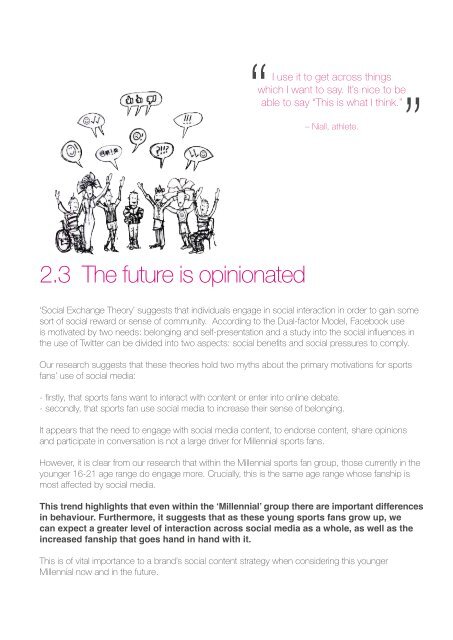99SYN14528_SocialSportsFanDoc-V2
99SYN14528_SocialSportsFanDoc-V2
99SYN14528_SocialSportsFanDoc-V2
You also want an ePaper? Increase the reach of your titles
YUMPU automatically turns print PDFs into web optimized ePapers that Google loves.
The younger the fan, the more likely they are to express<br />
their opinion through social media<br />
2.3 The future is opinionated<br />
“I use it to get across things<br />
which I want to say. It’s nice to be<br />
able to say “This is what I think.”<br />
– Niall, athlete.<br />
“<br />
Desire to express opinion through social media<br />
‘Social Exchange Theory’ suggests that individuals engage in social interaction in order to gain some<br />
sort of social reward or sense of community. According to the Dual-factor Model, Facebook use<br />
is motivated by two needs: belonging and self-presentation and a study into the social influences in<br />
the use of Twitter can be divided into two aspects: social benefits and social pressures to comply.<br />
Our research suggests that these theories hold two myths about the primary motivations for sports<br />
fans’ use of social media:<br />
- firstly, that sports fans want to interact with content or enter into online debate.<br />
- secondly, that sports fan use social media to increase their sense of belonging.<br />
It appears that the need to engage with social media content, to endorse content, share opinions<br />
and participate in conversation is not a large driver for Millennial sports fans.<br />
However, it is clear from our research that within the Millennial sports fan group, those currently in the<br />
younger 16-21 age range do engage more. Crucially, this is the same age range whose fanship is<br />
most affected by social media.<br />
This trend highlights that even within the ‘Millennial’ group there are important differences<br />
in behaviour. Furthermore, it suggests that as these young sports fans grow up, we<br />
can expect a greater level of interaction across social media as a whole, as well as the<br />
increased fanship that goes hand in hand with it.<br />
This is of vital importance to a brand’s social content strategy when considering this younger<br />
Millennial now and in the future.<br />
16-17 year olds 18-21 year olds 22-25 year olds<br />
The majority of participants stated that they preferred<br />
to be passive in their consumption of social media:<br />
there was no real ‘pull’ to show that sports fans<br />
use social media as a means to publicise their<br />
opinions, contrary to common belief. One fan noted<br />
that whilst they follow and check pages every day,<br />
they were admittedly ‘reluctant to comment as it’s<br />
on a public platform’ (Khash). This may be due to<br />
the increased awareness around privacy. Indeed,<br />
95% of respondents said they were aware that they<br />
are making a public statement about themselves<br />
when posting on social media.<br />
However, responses showed that both bigger fans<br />
and younger fans were more willing to be opinionated<br />
online, corresponding to their increased levels of<br />
engagement which we saw in the previous section.<br />
Once again this highlights the necessity of identifying<br />
the strata within what has traditionally been seen<br />
as a single homogenous group. Whilst lesser fans<br />
are more interested in consuming content, the larger<br />
fans are naturally more engaged and want content<br />
that creates discussion and a breadth of opinion.<br />
Brands need to cater to differences such as this in<br />
order for customers to find their content engaging.<br />
Furthermore, compared to other elements (e.g. music,<br />
clothing, company you keep) 65% of fans considered<br />
their online sporting identity to be the most reflective<br />
element of their offline identity. Clubs and societies<br />
associated with were 53% reflective, whereas the rest<br />
all showed at below average. This may be due to the<br />
nature of the interest itself: for example, whilst music<br />
tastes are extremely personal and therefore easy for<br />
people to criticise, sport is inherently more collective.<br />
It therefore feels ‘safer’ to showcase that element of<br />
our identity through social media.<br />
16-17 year-olds<br />
are twice as likely<br />
to be opinionated<br />
on social media as<br />
26-19 year-olds


